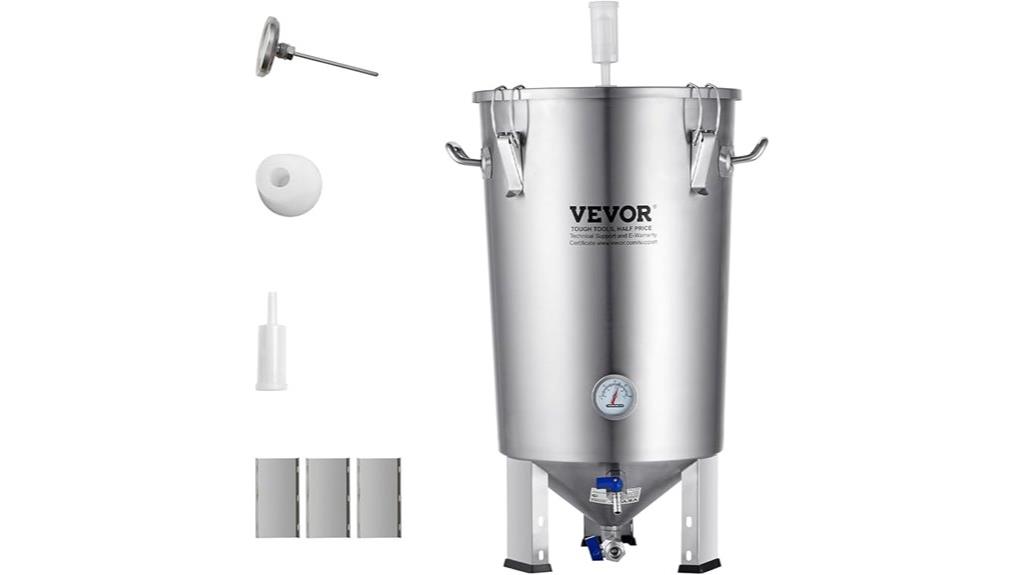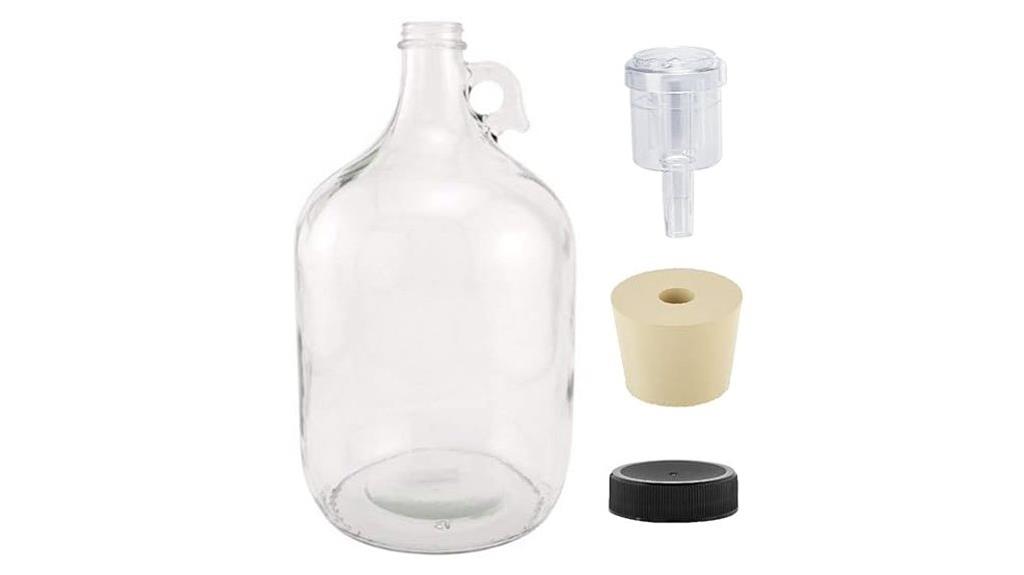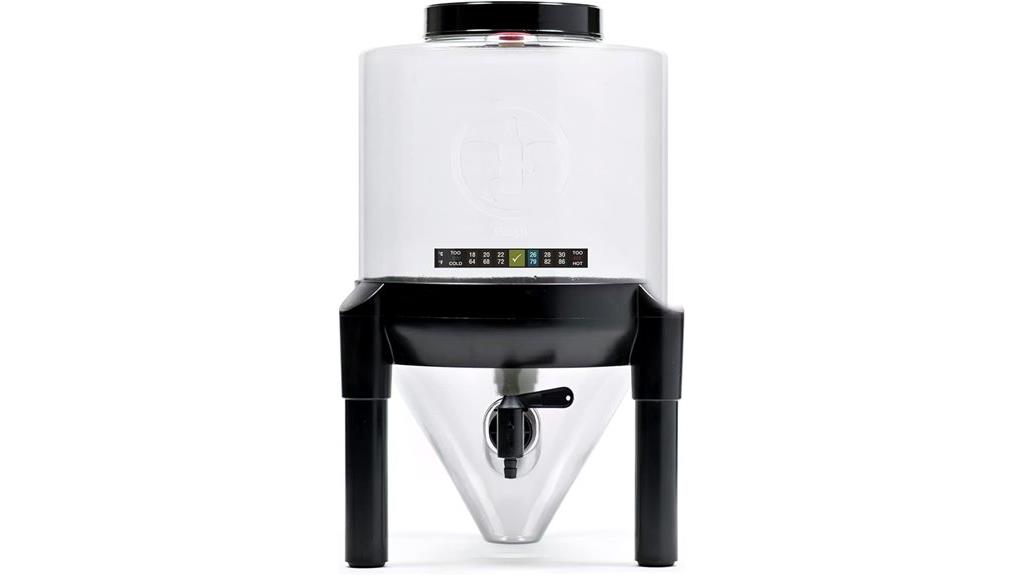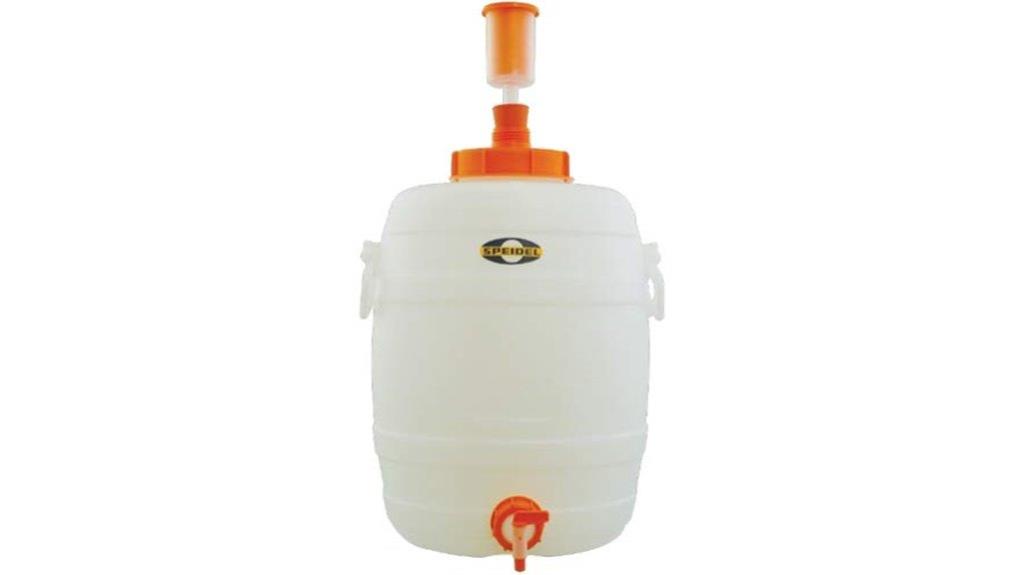Best Fermenters for Perfect Home Brewing
I’ve tested fermenters from 1-gallon glass jars to 8-gallon stainless steel tanks, and your choice depends on batch size and brewing goals. The VEVOR 8-gallon stainless steel fermenter excels for serious brewers, while 1.5-gallon glass jars with airlocks work perfectly for small batches and beginners. Speidel’s 30L plastic fermenter offers excellent value for standard 5-gallon batches. Key factors include airtight sealing, temperature control (60°F-75°F), and easy cleaning access. Below, you’ll discover specific features that separate exceptional fermenters from mediocre ones.
We are supported by our audience. When you purchase through links on our site, we may earn an affiliate commission, at no extra cost for you. Learn more. Last update on 4th December 2025 / Images from Amazon Product Advertising API.
Notable Insights
- Choose fermenter capacity based on batch size: 1-gallon for beginners, 5-gallon for standard batches, 8-gallon for serious brewers.
- Stainless steel offers durability, glass allows visual monitoring, and HDPE plastic minimizes oxygen transfer for flavor preservation.
- Essential features include airtight seals, airlocks for CO2 escape, integrated thermometers, and wide mouths for easy cleaning.
- Prices range from $20 basic glass carboys to $150+ premium models; evaluate included accessories for better value.
- Top 2025 picks include VEVOR 8-gallon steel tank, BrewDemon conical fermenter, and Speidel 30L plastic fermenter.
VEVOR Fermentation Tank 8 Gallon Stainless Steel Beer Brew Fermentor

The VEVOR Fermentation Tank stands out with its 8-gallon capacity and food-grade 304 stainless steel construction, making it an excellent choice for serious home brewers who want restaurant-quality equipment. You’ll appreciate the conical bottom design that collects sediment naturally, plus dual valves for easy yeast discharge and beer bottling. The integrated thermometer monitors temperatures from 32-104°F, while the silicone-sealed lid creates an airtight environment with optional one-way exhaust. The 0.5mm barrel thickness resists deformation, and you can literally invert it without spills. At 9 pounds with sturdy handles, it’s manageable yet durable for repeated use.
Best For: Serious home brewers who want professional-grade equipment for fermenting beer, wine, and spirits with precise temperature control and easy sediment management.
Pros:
- Food-grade 304 stainless steel construction with 0.5mm thickness provides exceptional durability and resistance to deformation
- Conical bottom design with dual valves allows for efficient sediment collection and easy yeast discharge without transferring to secondary vessel
- Integrated thermometer and airtight silicone seal with optional one-way exhaust creates optimal fermentation conditions
Cons:
- 8-gallon capacity may be too large for beginners or those with limited storage space
- At $49,449 ranking in Kitchen & Dining, it’s likely more expensive than basic plastic fermenters
- Stainless steel construction makes it heavier than plastic alternatives, potentially requiring more effort to move when full
North Mountain Supply 1 Gallon Glass Fermenting Jug with Handle

Beginning brewers and seasoned experimenters alike will appreciate the North Mountain Supply 1 Gallon Glass Fermenting Jug‘s built-in handle, which eliminates the awkward juggling act that comes with moving full fermenters. You’ll receive everything needed to start fermenting immediately: a #6.5 rubber stopper, two-piece airlock, and black plastic lid. This complete kit works perfectly for beer, wine, kombucha, or large yeast starters. The one-gallon capacity lets you experiment with new flavors without committing to massive batches. Made in the USA, this durable glass fermenter comes with a 30-day replacement program for damaged items.
Best For: Beginning brewers and seasoned experimenters who want to test small batches of beer, wine, kombucha, or yeast starters without committing to large quantities.
Pros:
- Built-in handle makes moving full fermenters safe and easy
- Complete kit includes all essential components (stopper, airlock, lid) for immediate use
- One-gallon capacity perfect for experimentation and flavor testing
Cons:
- Small capacity may not be suitable for those wanting larger batch sizes
- Glass construction makes it more fragile than plastic alternatives
- Limited to single-gallon batches which may require multiple units for bigger projects
BrewDemon Conical Fermenter by Demon Brewing Company

Small-batch brewers will find their perfect match in the BrewDemon Conical Fermenter, a compact powerhouse that brings professional brewing techniques to your kitchen counter. This USA-made fermenter handles 2 to 2.5-gallon batches perfectly, featuring a patented conical design that reduces trub contact for cleaner, clearer beer. You’ll appreciate the BPA-free, food-grade plastic construction that won’t affect your brew’s flavor. The innovative venting system eliminates the need for airlocks while preventing contamination, though you can upgrade to traditional airlocks if preferred. Your complete package includes the fermenter, base, adjustable spigot, temperature gauge, and bubbler upgrade—all backed by a two-year warranty.
Best For: Home brewers who want to make small batches of high-quality beer with professional-grade equipment in limited space.
Pros:
- Patented conical design reduces sediment contact for cleaner, clearer beer with better taste
- No airlock required thanks to innovative venting system, with option to upgrade for additional security
- Complete kit includes all necessary components plus 2-year warranty and live customer support
Cons:
- Limited to small 2-2.5 gallon batches, which may not satisfy brewers wanting larger quantities
- Plastic construction may not appeal to brewers who prefer glass or stainless steel fermenters
- Designed primarily for BrewDemon recipes, potentially limiting recipe flexibility
Speidel 30L Plastic Fermenter with Spigot for Homebrewing

German engineering meets homebrewing convenience in the Speidel 30L Plastic Fermenter, a heavy-duty HDPE vessel that transforms how you approach fermentation and cleaning. This 7.9-gallon fermenter handles standard 5-gallon beer batches or wine kits with ample headspace, eliminating blowoff tube requirements. The rotating spigot simplifies transfers while molded handles provide secure transport. You’ll appreciate the wide opening that allows thorough cleaning without specialized brushes or siphons. Heavy-duty HDPE construction resists oxygen transfer better than glass carboys, preserving your brew’s flavor and aroma. The included stopper and oversized 2-piece airlock complete this trusted fermenter that homebrewers worldwide consider a valuable carboy upgrade.
Best For: Homebrewers seeking a durable, easy-to-clean fermenter that handles standard 5-gallon beer batches or wine kits with superior convenience and safety compared to traditional glass carboys.
Pros:
- Heavy-duty HDPE construction resists oxygen transfer better than glass while being safer and more durable for long-term use
- Wide opening and molded handles make cleaning and transport significantly easier without requiring specialized brushes or siphons
- Rotating spigot simplifies transfers and ample headspace eliminates the need for blowoff tubes during fermentation
Cons:
- Some users report concerns about spigot durability over extended use
- Airlock compatibility issues may arise when trying to use with other non-Speidel products
- Plastic construction may not appeal to brewers who prefer the traditional aesthetic of glass carboys
Factors to Consider When Choosing a Fermenter
When I’m helping you choose the right fermenter for your brewing setup, several key factors will determine which option works best for your needs. The material affects both durability and flavor preservation, while capacity determines batch sizes you can produce (typically ranging from 1-gallon starter kits to 6.5-gallon standard batches). You’ll also need to evaluate sealing quality for proper fermentation, temperature control features for consistent results, and how easy the unit is to clean and maintain between batches.
Material and Durability
Three primary materials dominate the fermenter market, and each offers distinct advantages for home brewing success. Food-grade 304 stainless steel provides exceptional durability and resists deformation while minimizing dirt accumulation. I recommend choosing fermenters with 0.5mm barrel thickness, as this guarantees sturdiness during temperature fluctuations throughout fermentation.
Thick, BPA-free glass fermenters offer easy monitoring of your brew’s progress and resist breakage better than thin alternatives. You’ll appreciate how glass allows visual inspection without opening the vessel.
Heavy-duty HDPE plastic presents the safest option, resisting oxygen transfer more effectively than other materials. This preservation protects your beer’s flavor and aroma during fermentation. Regardless of material choice, durable construction makes cleaning easier and reduces residue buildup, guaranteeing your future batches remain uncontaminated.
Capacity and Size
Choosing the right fermenter capacity directly impacts your brewing efficiency and determines how much beer you’ll produce per batch. I recommend starting with 1-gallon fermenters for small experimental batches, then scaling up to 8-gallon options for larger projects. Consider your available space carefully—dimensions like 24.61 x 14.96 x 14.76 inches work well in most kitchen settings.
Pay attention to usable space versus total capacity. A 1.5-gallon jar typically provides 1.3 gallons of actual fermentation space, which affects ingredient calculations. For ongoing brewing projects, choose fermenters that fit under standard kitchen cabinets for easy storage and access.
Match your fermenter size to specific recipes—some require 2-gallon brewing systems for ideal results. This planning prevents overcrowding and guarantees proper fermentation conditions.
Sealing and Airtightness
Proper sealing transforms your fermenter from a simple container into a controlled environment that protects your beer from contamination and oxidation. I recommend looking for vessels with silicone gaskets or airtight lids that create a complete seal around the rim. The integrity of this seal directly impacts your fermentation quality by maintaining proper anaerobic conditions.
Airlocks are essential features that allow CO2 to escape while preventing outside air from entering your fermenter. Look for screw-top closures or clasp seals that make accessing your beer easy without compromising airtightness. Any leakage during fermentation can introduce unwanted bacteria and wild yeasts that’ll spoil your batch. Test the seal before each use to verify your fermenter maintains its protective barrier throughout the entire fermentation process.
Temperature Control Features
Several key temperature control features can make the difference between successful fermentation and disappointing results. I recommend looking for fermenters with integrated thermometers that provide real-time temperature readings. Most beer and wine fermentations thrive between 60°F to 75°F (15°C to 24°C), so you’ll want dual-scale thermometers showing both Celsius and Fahrenheit. Quality fermenters typically cover 0-40°C (32-104°F) ranges, giving you flexibility for different yeast strains and fermentation styles.
Consider fermenters with one-way exhaust pipes that release CO2 while preventing oxygen infiltration. This feature helps maintain stable temperatures throughout the process. Maintaining consistent temperatures minimizes off-flavors and dramatically improves your finished product’s quality. Temperature fluctuations can stress yeast and create unwanted compounds, making reliable monitoring essential for successful home brewing.
Cleaning and Maintenance
Effective cleaning often determines whether your fermenter produces outstanding beer or becomes a breeding ground for unwanted bacteria and wild yeast. I recommend choosing fermenters made from food-grade glass or stainless steel since these materials clean easily and resist contamination better than plastic alternatives. Look for wide mouth openings and smooth interior surfaces that let you scrub every corner without struggle. Avoid designs with excessive nooks and crannies where debris can hide. Features like removable parts and integrated spigots make thorough cleaning much simpler during your maintenance routine. I sanitize my fermenter between every batch using no-rinse sanitizers, which prevents cross-contamination and guarantees consistent quality in each brew you create.
Price and Value
When choosing a fermenter, you’ll find prices spanning from $20 for basic glass carboys to $150 or more for premium stainless steel units with advanced features. I recommend evaluating the complete package, not just the base price. Look for included accessories like airlocks, lids, and temperature gauges that add value without extra costs.
Material quality greatly impacts long-term value. Food-grade stainless steel and durable glass cost more upfront but reduce replacement needs over time. Consider your brewing volume when selecting capacity – larger fermenters offer better value for frequent brewers by improving efficiency and reducing batch times.
Before purchasing, I always check customer ratings and comparison studies. A higher-priced fermenter with poor reviews doesn’t represent good value, regardless of fancy features.
On a final note
I’ve shown you eight excellent fermenters that’ll handle any home brewing project you have in mind. Whether you’re making small batches in mason jars or scaling up with an 8-gallon stainless steel tank, there’s an option here for your needs. Consider your batch size, material preferences, and budget when making your choice. Start with one that matches your current brewing goals, and you’ll be producing quality fermented beverages in no time.
